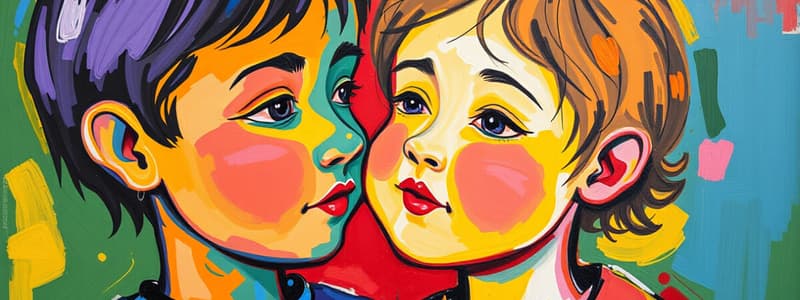Podcast
Questions and Answers
What personality trait is associated with excessive parental tolerance during the anal stage?
What personality trait is associated with excessive parental tolerance during the anal stage?
- Narcissistic personality
- Anal-expulsive personality (correct)
- Anal-retentive personality
- Dependency personality
Which complex describes a young girl's feelings toward her father during the phallic stage?
Which complex describes a young girl's feelings toward her father during the phallic stage?
- Fixation complex
- Socratic complex
- Electra complex (correct)
- Oedipus complex
What is the primary focus of children's activities during the latency stage?
What is the primary focus of children's activities during the latency stage?
- Social and intellectual skill development (correct)
- Sexual exploration
- Bodily control
- Parental competition
What is the primary conflict in the Oral Stage of development according to Freud?
What is the primary conflict in the Oral Stage of development according to Freud?
How does Freud's theory view the importance of the first three stages compared to the last two?
How does Freud's theory view the importance of the first three stages compared to the last two?
What does Freud identify as a potential consequence of fixation at the Oral Stage?
What does Freud identify as a potential consequence of fixation at the Oral Stage?
What outcome can result from fixation at the latency stage according to Freud?
What outcome can result from fixation at the latency stage according to Freud?
Which of the following correctly summarizes Freud's view on the stages of psychosexual development?
Which of the following correctly summarizes Freud's view on the stages of psychosexual development?
What does the term 'libido' refer to in the context of Freud's stages?
What does the term 'libido' refer to in the context of Freud's stages?
What age range does Freud associate with the Anal Stage of development?
What age range does Freud associate with the Anal Stage of development?
Study Notes
Development of Self and Social Understanding
- Children experience rapid growth in multiple areas: physical, communication, cognitive, and emotional development.
- Social and emotional development involves understanding one’s identity, feelings, and interactions with others, facilitating relationship building and emotional exploration.
Sigmund Freud's Psychosexual Stages
- Freud theorized personality development occurs through five psychosexual stages, each centered on an erogenous zone that brings pleasure and conflict related to that stage.
- Successful resolution of each stage leads to a healthier personality, while fixation can result in obsessive behaviors typical of unresolved earlier conflicts.
Oral Stage
- Duration: Birth to one year.
- Focus: Mouth, with key activities centered on sucking and feeding.
- Primary conflict: Weaning process, transitioning from dependency on caregivers.
- Fixation can lead to issues like overeating, smoking, and dependency problems.
Anal Stage
- Duration: One to three years.
- Focus: Anus, where children learn to control bowel movements.
- Conflict arises from parental responses, potentially leading to anal-expulsive (messy, destructive) or anal-retentive (strict, organized) personality traits.
Phallic Stage
- Duration: Three to six years.
- Focus: Genitals, awareness of gender differences emerges.
- The Oedipus complex (boys' desire for mothers) and Electra complex (girls' desire for fathers) highlight children’s attraction to opposite-sex parents and rivalry with same-sex parents.
Latency Stage
- Duration: Six years to puberty.
- Characterized by exploration and the development of social and intellectual skills, where the libido is dormant.
- Fixation might lead to immature personality traits and difficulties in sustaining relationships.
Genital Stage
- Duration: Puberty to death.
- The libido reactivates focused on sexual interests and fulfilling relationships.
- Balanced personality development relies on experiences from the earlier stages.
Critique of Freud's Theory
- Critics argue Freud's theory is overly focused on male development and lacks empirical testability.
- The later two stages are considered less relevant, while the absence of a female perspective reflects outdated societal norms.
- Despite criticisms, Freud’s theory paved the way for understanding various aspects of human development.
Erikson's Stages of Psychosocial Development
- Erik Homburger Erikson proposed that personality evolves through a series of psychosocial stages, each involving a crisis that impacts personality.
- Successfully overcoming each stage results in acquiring a basic virtue, whereas failure may lead to unhealthy personality traits that could be addressed later in life.
- Erikson's theory parallels Freud's but focuses more on social relationships and challenges than on sexual development.
Studying That Suits You
Use AI to generate personalized quizzes and flashcards to suit your learning preferences.
Description
This quiz focuses on the development of self and social understanding in children. It explores how children grow physically, emotionally, and cognitively, and the significance of their interactions with others. Theories of development will also be discussed to provide a comprehensive understanding of these processes.




